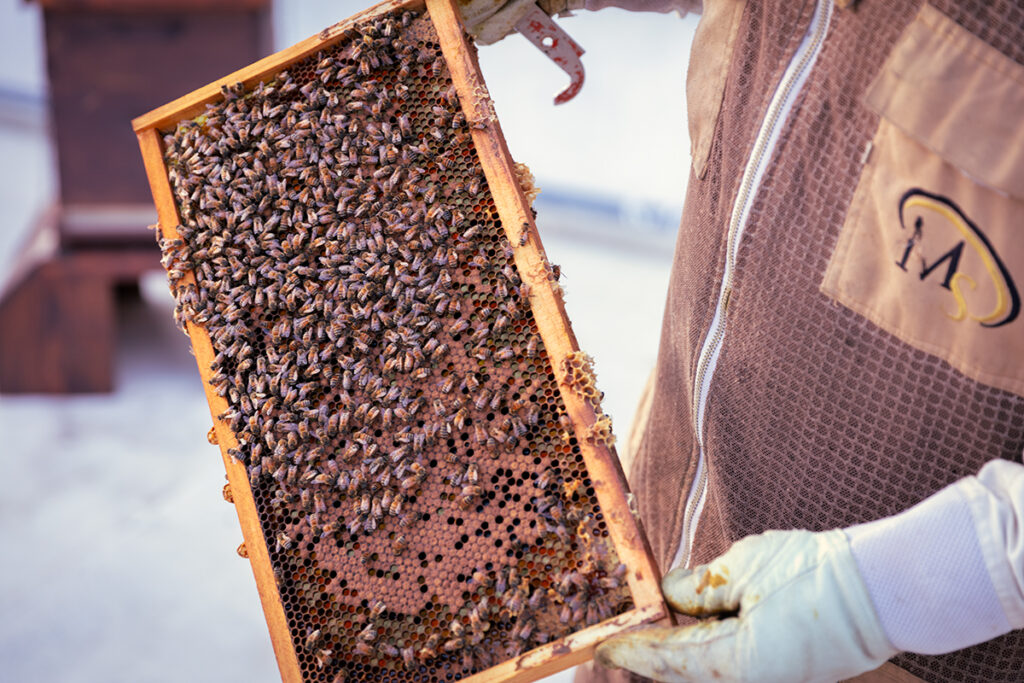David Friesen describes the first time he was surrounded by buzzing bees as both electric and peaceful.
“Most people don’t find themselves in a cloud of bees,” says Friesen, the founder of Bee KC, a nonprofit urban beekeeping organization. Friesen says the first time can boost your adrenaline, but then it becomes quite peaceful as you learn to navigate the bee swarm and tend to the hive. “It’s a meditative experience,” he says.
Friesen’s uncle has kept bees most his life. About 12 years ago, when Friesen was paying him a visit in California, his uncle taught him how to beekeep. Friesen took that experience and started keeping his own hives here in Kansas City.
Friesen, who founded Betty Rae’s Ice Cream but has since sold the business, dove into beekeeping full time about two years ago with the creation of his nonprofit Bee KC.
Bee KC has installed and maintained about 150 honey bee hives in the greater metro area, as well as native bee homes at all the sites. The beehives are scattered everywhere from restaurant rooftops and urban farms to KU’s Medical Center botanical gardens and vacant lots. But Bee KC is doing more than just maintaining bees. Friesen and his board members are out in the community teaching people about the importance of bees in the ecosystem through workshops and classroom visits.
“Bees pollinate essentially one-third of everything we eat,” Friesen says. “So one in three bites of your food is thanks to honeybees.”
Part of maintaining the hives is collecting the honey. The people and organizations hosting the hives get a portion of the honey collected by Bee KC to use or sell as they see fit, and Bee KC keeps the remainder, selling the honey at local markets.
Each hive’s honey has a distinctive flavor, depending on the plants the bees are pollinating, even within the confines of KC, Friesen says.
Bee KC isn’t the only bee game in town. Just a few years ago, Dr. Marion Pierson was a pediatrician. Now she’s a beekeeper and the founder of Mo Hives KC, another nonprofit urban beekeeping organization.
Pierson’s organization focuses on placing hives in vacant lots in blighted community areas as a way of bringing life to the area. Her motto is “let’s clean it up,” and adding bees to the environment is a way to do that. Pierson reclaims many of these forlorn locations by adding bushes, flowers and other vegetation and then plunking down a few hives.
Pierson also sees her bee gardens as a way of connecting urban kids with nature and the sources of their food, teaching them how to tend to gardens and grow food along the way. One way she does this is through Mo Hives KC’s long-term agreement with Community Builders KC for six lots that make up its Wabash Avenue apiary site (between 50th and 51st streets). These lots had been vacant for nearly a decade.
“What we’re really doing is converting vacant space that people see as a negative in the community into an asset in the community,” says Pierson, who was named 2021 Missouri Beekeeper of the Year by the Missouri State Beekeepers Association.
KC Area Bee Clubs

For those interested in learning more about beekeeping, there are several local clubs:
Northwest Missouri Bee Busters, beebusters2012@gmail.com
Swarm Chasers, swarmchasers.org
Northland Beekeepers, leeland55@gmail.com
Midwestern Beekeepers, midwesternbeekeepers.org
Cass County Bee Club, thekansasbeeco@yahoo.com
Golden Valley Beekeepers, gvbeekeepers.com






